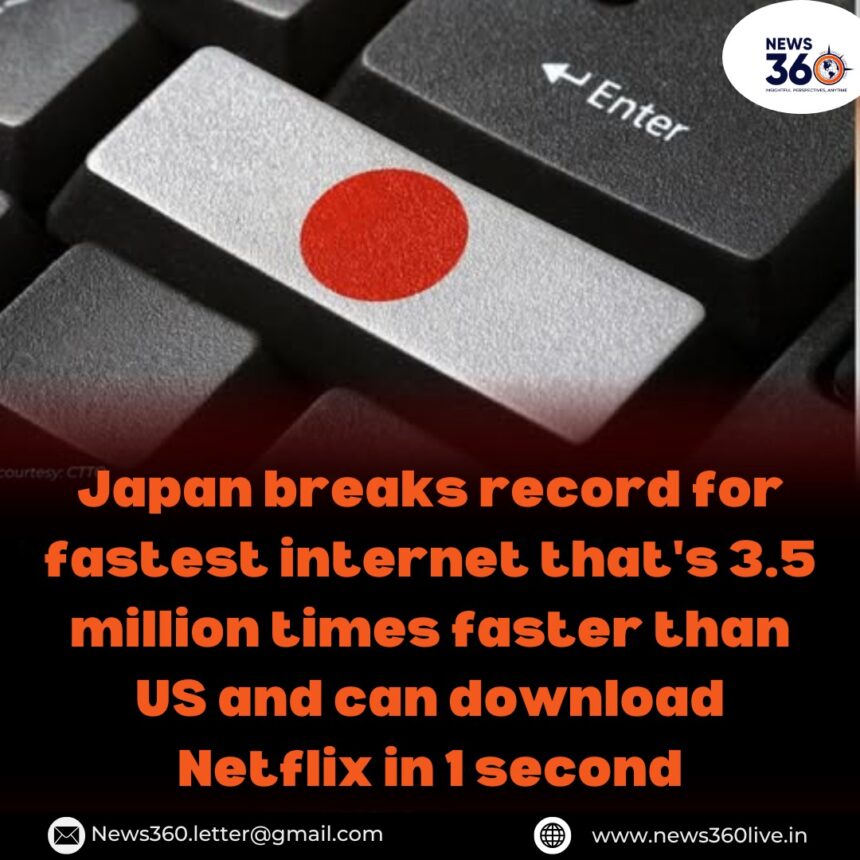Japan Shatters Internet Speed Record: 1.02 Petabits Per Second – What It Means for You
Imagine downloading the entire Netflix library in seconds. This isn’t science fiction anymore. Japan just set a stunning new world record for internet speed, hitting an unbelievable 1.02 petabits per second. This groundbreaking achievement represents a monumental leap forward in how we transfer data. It truly changes what’s possible online.
To put this speed in perspective, consider India’s average internet speed. Japan’s new record is about 16 million times faster than that. Think about how much data could flow at such a rate. This massive speed increase isn’t just a number; it points to a future where internet bottlenecks might become a thing of the past. It raises questions about how we will use the internet moving forward.
Understanding the Breakthrough: What is 1.02 Petabits Per Second?
The ability to send data at 1.02 petabits per second relies on truly innovative science. Researchers used advanced optical fibers to carry vast amounts of data without losing signal strength. They also designed special light signals that pack more information into each pulse. This kind of research pushes the very limits of physics and engineering. It took years of dedicated work to reach this point.
Petabit vs. Gigabit: A New Scale of Data Transfer
We often hear about megabits and gigabits when talking about internet speed. A gigabit is 1,000 megabits. Now, picture a petabit. A single petabit is 1,000 terabits, or a mind-boggling 1 million gigabits. To put it simply, if a gigabit connection lets you download a movie in minutes, a petabit connection would let you download thousands of movies in that same time. It’s like comparing a garden hose to a raging river.
The Role of Advanced Fiber Optic Technology
This record-breaking speed wasn’t achieved with standard internet cables. Scientists at Japan’s National Institute of Information and Communications Technology (NICT) led this charge. They developed a unique four-core optical fiber. This special fiber carries data through four distinct pathways, all within a cable the same size as current single-core fibers. They also used advanced laser technology to send many different wavelengths of light through these cores. Each wavelength carries even more data, creating an immense total capacity.
The Impact on Global Internet Infrastructure
This new speed standard will reshape how internet infrastructure grows worldwide. Current systems simply aren’t built for this level of data flow. We will need new ways to manage and route information. It pushes engineers to rethink every part of the network.
Implications for Data Centers and Cloud Computing
Data centers are the backbone of the internet. They store and process all the information we use. With ultra-fast speeds, these centers can handle much more data, much faster. Cloud computing, which relies on these centers, will see huge gains. Imagine instantly loading complex programs or analyzing massive datasets in seconds. This speed helps new applications run smoothly and process data quickly.
The Future of Network Architecture
Our internet networks are like a huge web of roads. This petabit speed means we’re going from single-lane paths to superhighways. Network engineers will need to design new routes and junctions. This will help prevent traffic jams. It could mean building entirely new kinds of cables and switching stations. The goal is to make sure data can flow freely across countries and continents.
Real-World Applications and Future Possibilities
Such incredible internet speeds will change many parts of our lives. They will make things we currently dream about possible. Every industry stands to benefit from this advancement.
Revolutionizing Communication and Collaboration
Imagine talking to someone on the other side of the world with no delay at all. High-definition video calls for huge groups would be crystal clear. Remote teams could work on detailed projects together in real-time. It would feel like everyone is in the same room. These speeds remove almost all barriers to global communication.
Enhancing Emerging Technologies (AI, VR/AR, IoT)
Today’s cutting-edge tech needs tons of data. Artificial intelligence learns from vast amounts of information. Virtual and augmented reality need to stream highly detailed worlds instantly. The Internet of Things (IoT) connects countless devices, all sending data. Ultra-fast internet helps these technologies grow faster. It makes their widespread use a real possibility.
Next-Generation Entertainment and Gaming
Gamers, prepare for a new era. Ultra-immersive virtual reality games could stream directly to your headset, with no downloads needed. Massive game files could appear on your console in a flash. Streaming movies and shows would offer incredible detail and no buffering, ever. It makes today’s best experiences seem slow.
Bridging the Digital Divide: Challenges and Opportunities
Bringing these amazing internet speeds to everyone presents big challenges. Not every country or region has the same resources. We must think about how to share this technology widely.
The Cost of Infrastructure Upgrades
Upgrading internet networks to support petabit speeds will be very expensive. Laying new fiber optic cables and installing advanced equipment costs a lot of money. Richer nations might adopt it first. Poorer regions could face a big financial hurdle. We need smart plans to fund these upgrades globally.
Bridging the Gap with Developing Nations
The digital divide could grow even wider without careful planning. Developing nations need support to build their own advanced internet infrastructure. This could involve international partnerships or special funding programs. The goal is to make sure everyone can access and benefit from these new speeds. It’s important to prevent some parts of the world from falling further behind.
Expert Insights and Perspectives
Many experts are excited about this record but also see the challenges ahead. They believe this is just the beginning of a new internet era. We asked some leading minds what they think.
Predictions for the Next Decade of Internet Speed
“This 1.02 petabit record proves what’s possible,” says Dr. Hiroshi Tanaka, a telecommunications researcher. “We might see speeds of several petabits, maybe even exabits, within the next decade. The pace of discovery is quickening.” This means even faster internet is likely coming sooner than we think. The next major leap could be just around the corner.
The Ethical and Societal Implications of Ultra-Fast Internet
“Faster internet means more data flows,” notes Dr. Anya Sharma, a digital ethics specialist. “This brings up big questions about data privacy and online security. We need strong rules and tech solutions to keep information safe.” She also adds, “Ultra-fast internet could change how we interact daily. We might become even more connected to our digital lives.”
Conclusion: A Glimpse into the Hyper-Connected Future
Japan’s new petabit internet speed record is a huge step forward for technology. It shows us what’s truly possible for our future. This achievement will change many industries, from cloud computing to virtual reality. It means new ways to communicate and enjoy entertainment.
We still face challenges in making these speeds available to everyone. Investing in new infrastructure and helping developing nations are key. But this record reminds us of a hyper-connected future. It’s a future where information flows almost instantly, connecting us all in new and exciting ways.

